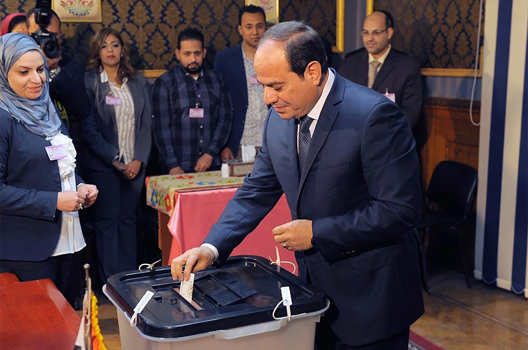 Egyptians are going to the polls to vote in a presidential election for the third time since the uprisings of 2011. The act of voting for a president who could, ostensibly, be voted out was a novelty. Hosni Mubarak served five six-year terms before stepping down in February of 2011, and Egyptians were keen on taking advantage of their new rights. This election, however, is likely to see a low turnout at the polls.
Egyptians are going to the polls to vote in a presidential election for the third time since the uprisings of 2011. The act of voting for a president who could, ostensibly, be voted out was a novelty. Hosni Mubarak served five six-year terms before stepping down in February of 2011, and Egyptians were keen on taking advantage of their new rights. This election, however, is likely to see a low turnout at the polls.

The first reason is that it is viewed by many in Egypt as a referendum rather than an election. There are two candidates: the incumbent, President Abdel Fattah El-Sisi and the head of the centrist Ghad party, Moussa Mostafa Moussa. Moussa scrambled to present his papers, finishing just minutes before the deadline for nominations had expired. Moussa’s credentials as a serious candidate are not particularly burnished given that, at the time of his nomination, his Facebook page declared his support for Sisi’s candidacy.
There had been other candidates. Two of them, both military men, were arrested for contravening army rules; Egyptian officers cannot retire from the army, they must be released. The army maintained that neither Ahmed Konsowa nor Samy Anan ever obtained such a release. Three other candidates dropped out. Ahmed Shafik was escorted from the airport on arrival from the UAE, spent some time at a luxury hotel in Cairo and then said he’d reconsidered. Khalid Ali and Anwar al-Sadat cited a lack of a level playing field before withdrawing their candidacy. Moussa is likely to stand no chance at all.
Notwithstanding the very real issues that Egypt faces—an economy still struggling to its feet in the wake of the tumultuous post-uprising years, declining political and civic freedoms and a looming security threat—Mr. Sisi still has a very significant following. However, it is unlikely that any but his most ardent fans will head for the polls.
Read the full article here.
Mirette F. Mabrouk is a senior fellow and director of the Egypt Program in the Atlantic Council’s Rafik Hariri Center for the Middle East.
Image: Egyptian President Abdel Fattah al-Sisi casts his vote during the presidential election in Cairo, Egypt March 26, 2018. (The Egyptian Presidency/Handout via REUTERS)
